Traumatic Brain Injuries
Traumatic Brain Injuries (TBI) can vary significantly from individual to individual and many TBIs result in symptoms that can be with you for the rest of your life.
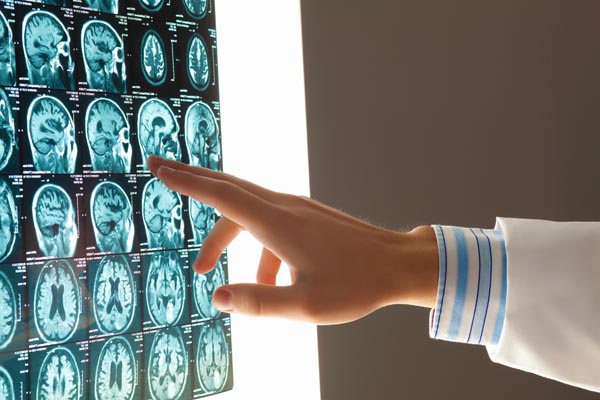 It only takes a moment for a traumatic brain injury to occur but the negative effects can last a lifetime.
It only takes a moment for a traumatic brain injury to occur but the negative effects can last a lifetime.
Since the symptoms of traumatic brain injury can be mild initially, some people do not even realize that they have suffered a TBI until many years later. Due to the wildly varying symptoms and the length of time since the initial injury, traumatic brain injuries can often be very challenging for modern medicine to treat.
Many people suffering from TBI have begun seeking alternative therapies like medical cannabis.
In this article, we are going to look at what causes traumatic brain injuries and help you to determine if medical cannabis may be an option for you, or a loved one, who is suffering from a TBI.
Our goal here at Kanteeva is to provide you with the information that you will need to make an educated decision about medical cannabis as an option to help deal with the symptoms of traumatic brain injury. After reading this article, you should be able to decide if you would like to pursue medical cannabis as a treatment option and you will have a solid foundation of knowledge so you can effectively discuss your treatment options with your healthcare provider(s).
If you have any additional questions please do not hesitate to leave a comment or question below. A member of the Kanteeva team will get in touch with you as soon as possible.
What Are Traumatic Brain Injuries?

A lot of times in traumatic brain injuries, the person after is different than the person before.
The Center for Disease Control and Prevention defines traumatic brain injury (TBI) as:
a disruption in the normal function of the brain that can be caused by a bump, blow, or jolt to the head, or penetrating head injury.
Traumatic brain injuries are a major medical concern and are far more severe than the explanation given by this simple definition. In 2014, an average of 155 people in the United States died each day from injuries that included a TBI, according to the CDC.
This is a terrifying statistic and it places traumatic brain injuries as one of the leading causes of accidental death in North America, especially among children and young adults.
For those fortunate enough to survive the initial symptoms of a traumatic brain injury, the battle is often just beginning. Many people find that after experiencing a TBI their lives are forever changed. Complications can develop quite quickly or they can develop over the course of many months or even years.
Some of the symptoms of traumatic brain injury in adults and children include things like:
- Chronic Headaches
- Coordination Impairment
- Vomiting or Nausea
- Slurred Speech
- Feeling Drowsy or Being Unable to Be Awakened
- Dilated Pupils or Singular Dilated Pupil
- Seizures or Convulsions
- Sudden Difficulty Recognizing People or Places
- Increasing Agitation, Confusion or Restlessness
- Atypical Behavior after Head Trauma
- Loss of Consciousness
Very young children can experience any of the symptoms listed above, as well as consistent crying that is inconsolable or refusing to nurse or eat. When it comes to a traumatic brain injury the best course of action is to always seek immediate medical treatment.
How are TBIs Currently Treated?
 The symptoms of traumatic brain injury can vary significantly between individuals. As a result of this, TBIs are often treated differently based on the specific symptoms that each individual has.
The symptoms of traumatic brain injury can vary significantly between individuals. As a result of this, TBIs are often treated differently based on the specific symptoms that each individual has.
Many people experience some form of long-term pain (i.e. headaches, body aches) from a traumatic brain injury. Patients often find themselves being treated with a variety of different opioid medications but unfortunately these opioid medications come with their own array of potential side effects like liver and kidney failure when used for prolonged periods of time, as well as being highly addictive. Sadly, prolonged opioid use is often the only treatment option provided by modern medicine. For many people suffering from a TBI, opioids are the only way they know to find relief from the chronic pain associated with this ailment.
Depending on other symptoms, common medications that are often prescribed in the treatment of TBI are antidepressants, anticonvulsants and mood stabilizing medications. Unfortunately, many people suffer side effects from these medications; many patients claim that they find themselves feeling addicted to many of the prescribed medications they are taking. Some of these medications are extremely habit forming and patients say that they are physically or mentally unable to stop using them.
Treatment for TBI will normally also include physical therapy, occupational therapy and possibly a spectrum of surgeries that are aimed at helping people to regain as close to normal functioning as possible.
What Does Science Say about Medical Cannabis and TBI?
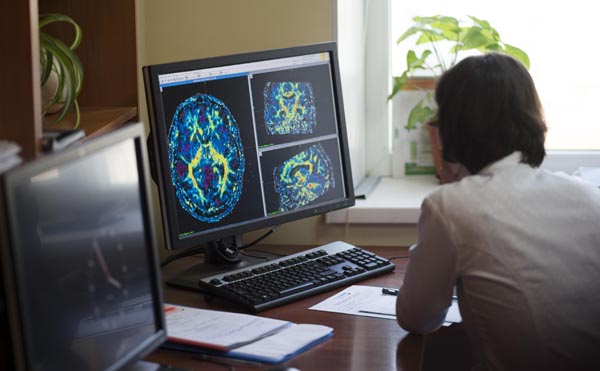
The investigation of phytocannabinoids on TBI pathology not only holds topical relevance, but also but also holds promise as potential treatment for TBI and other disorders.
- Endocannabinoid study published by Frontiers in Pharmacology
Although research on TBI and Medical cannabis is limited, recent scientific research has shown promising results that coincide with anecdotal evidence from patients who have been successfully using cannabis as a medicine to treat their symptoms of TBI.
This current research concludes that there is promise for treatment with medicinal cannabis in all three stages of Traumatic Brain Injury:
- Preinjury
- During the Injury
- Postinjury
This study published in 2014 found that people who had consumed cannabis in the recent past were less likely to die after suffering a TBI. The study concluded stating:
A positive THC screen is associated with decreased mortality in adult patients sustaining TBI.
This is important to note as some members of the medical cannabis community suggest that cannabis should be consumed daily in low doses similar to how people take nutritional supplements to maintain optimum performance of their body. While this is a topic of debate at present, studies like the one above give credit to the potential medicinal benefits of consuming a daily dosage of cannabis.
When it comes to treating the effects of cannabis on TBI postinjury the common conclusion of the most recent scientific research is that the best results are achieved when cannabis is administered shortly after the initial brain injury. One study conducted in 2011 showed that people suffering from a TBI experienced the neuroprotective effects of cannabis when it was administered within hours of injury. The study concluded stating:
In conclusion, we have demonstrated that the eCB system, by acting at each of the components of the neurovascular unit, has the ability to affect the functional outcome after TBI by a variety of mechanisms.
Other research by Professor Yosef Sarne at Tel Aviv University showed a positive relationship between cannabis and TBI. Professor Sarne concluded that cannabinoids administered within 1-3 days of the initial brain injury can help protect brain cells and long-term cognitive functions. For those already suffering from a past TBI, these results may be the gateway to more treatment options with cannabis in the future.
While studies showing the effects of cannabis on TBI after injury are limited, it is important to know that there have been numerous scientific studies conducted on many of the symptoms of TBI and cannabis has shown to be very beneficial. Symptoms such as seizures, neural inflammation, headache, chronic pain and many more have been alleviated with medical cannabis therapy. Recent research has demonstrated that not only can cannabis help provide relief from the symptoms associated with TBI but it can also help with preventative and postinjury care.
While we wait for more medical research to be conducted, there are many different testimonials from patients who have found relief from their symptoms of TBI by using medical cannabis therapy.
Can Medical Cannabis Help Treat Traumatic Brain Injuries?
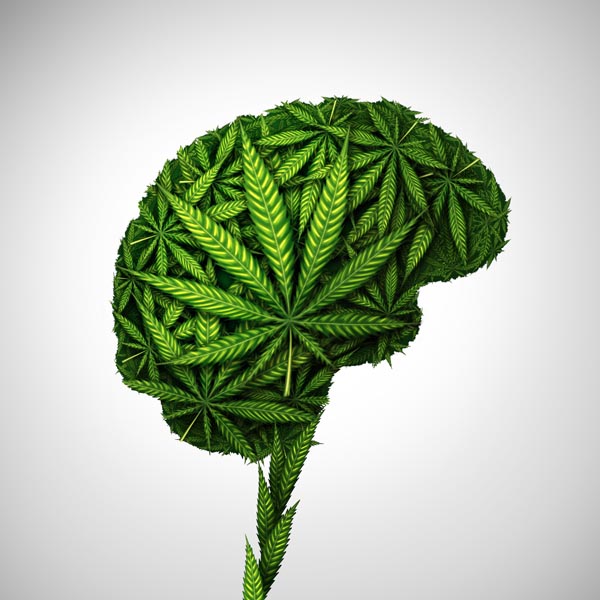
I credit it to not only God helped me, but also credit it to medical cannabis.
– Brian Keyner on his survival and recovery from a TBI
In recent years, more people have been able to access medical cannabis and some of these patients have been generous enough to give testimonials about their personal success using medical cannabis therapy to help treat the symptoms of TBI. One person who has been kind enough to share his story with the world is Brian Keyner.
Brian is a retired police officer who says he would still be a police officer today if it was not for sustaining a traumatic brain injury during a pursuit in 2008. He was struck by a vehicle while pursuing a gang member. Since his initial TBI, Brian has found himself in a battle for his life.
In an interview with United Patients Group, Brian stated that doctors did not give him a positive diagnosis and that he was told his survival was going to be “day-to-day.” He went on to share that he was in a coma for 16 days and medical professionals told his father and family that, “if I did wake up, that I’d have to be a vegetable.”
At one point in his interview, Brian shared that he had been on 5 to 7 pharmaceutical drugs for 3 to 4 years and still found himself feeling frustrated and that he did not know what to do with such limited medical options. He went on to say that fortunately a friend introduced him to medical cannabis.
He said that he was initially against medical cannabis but decided that after considering his options that he would give it a chance. He stated that he had a friend who operated the company, Myriam’s Hope. This company produced medical marijuana oils, tinctures and other products.
Regarding how medical cannabis had helped him, Brian has stated that, “It was amazing how something took away my depression, took away my pain, took away a lot of other stuff, and it steered me in the right direction.”
Brian did imply that medical cannabis has not solved all of his issues related to his TBI.
He went on to say, “I still have struggles, don’t get me wrong. But also, it’s taken away a lot of the struggles that I had before.” He then agreed with the interviewer that medical cannabis is something that has let him reclaim his life.
Over the course of the interview, Brian continued to share his story about how he continues advocating for medical cannabis and how it has allowed him to be a father and husband again, as well as allowing him to complete multiple tasks that he was told by medical experts that he would never be able to do again.
If you’d like to see the entire interview, click play below:
The Takeaways from Brian’s Story
Brian was able to find success in treating some of the symptoms of TBI with medical cannabis. It is important to remember that he consulted with a healthcare provider who understood both medical cannabis and his unique condition.
As with many other ailments and symptoms, ongoing research is still being conducted on how effective medical cannabis can be for treating the symptoms of traumatic brain injury.
What are the Best Marijuana Strains for Traumatic Brain Injuries?
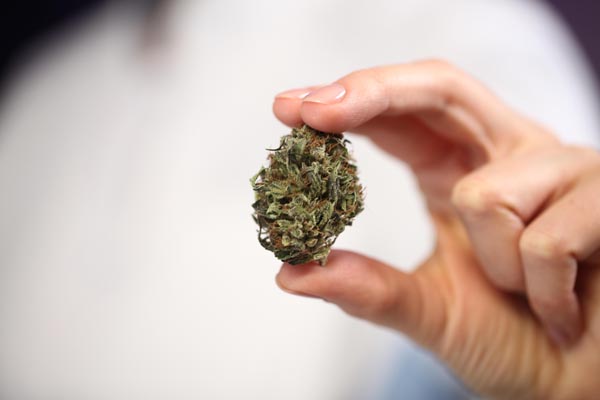
Finding the best marijuana strains to help with some of the many different symptoms that can occur from TBI can be challenging. Since TBI symptoms can vary significantly for each person, you should consult with a healthcare provider before starting any medical cannabis treatment.
Read our in-depth Kanteeva articles on symptoms associated with TBI, like anxiety, migraine headaches and chronic pain to learn more about specific medical cannabis strains that we recommend.
Most people who find relief from the symptoms of TBI through medical cannabis say that it can take several days or weeks of trying different strains and consumption methods before they are able to find the strains that are optimal for their needs.
Since the symptoms associated with TBI can vary from patient to patient, many people report that it is best to start your cannabis therapy with a strain that contains equal amounts of THC and CBD, or a 1:1 ratio.
This makes sense as studies have shown that THC can work as a neuroprotectant, while CBD has anti-inflammatory benefits. For people suffering from TBI, the combination of both THC and CBD in equal parts should deliver the most medical benefits possible. As always, it is best to consult with your healthcare provider(s) before making a final decision on which cannabis strain(s) may be the most beneficial for your individual needs.
What are the Top Strains for Traumatic Brain Injuries?
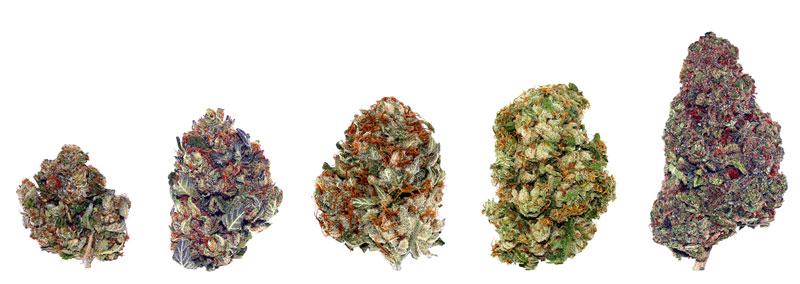
Here at Kanteeva, we conduct our due diligence in order to provide the community with the best information we possibly can. We base these recommendations on testimonials from medical cannabis community members, anecdotal evidence, scientific research and other factors like accessibility.
Dancehall
This slightly Sativa Dominant Hybrid is a favourite strain for newcomers to medical cannabis as it has low THC content of 9% and a very high CBD content of up to 16%. While it is not a 1:1 ratio strain, it is a popular choice among patients seeking relief from symptoms associated with TBI and is widely available in most areas. Dancehall is a great strain for daytime use as the cerebral psychoactive effects of this strain are mild because of its low THC content.
Pennywise
This potent Indica Dominant Hybrid has gained a lot of popularity in recent years among the medical cannabis community. With an ideal 1:1 THC to CBD ratio that ranges from 12% to 15%, Pennywise is a strain that can be a great choice for beginners. Thanks to its increasing popularity, this strain is another option that is widely available. Pennywise is an ideal medical cannabis strain for evening or night time use as its sedative effects can help induce relaxation and sleep, as well as offering pain relief.
Cannatonic
This 50/50 Hybrid strain has received more than 23 awards since 2008 and is a very popular choice among patients suffering from TBI symptoms. It often has a 1:1 ratio of THC to CBD and is usually around 6% - 14%, although in some cases the CBD content can be as high as 23%. The CBD content can fluctuate significantly with this strain, so make sure to pay attention to how much THC and CBD are contained in each product or dosage, so you can use it as a baseline for the future.
Final Thoughts
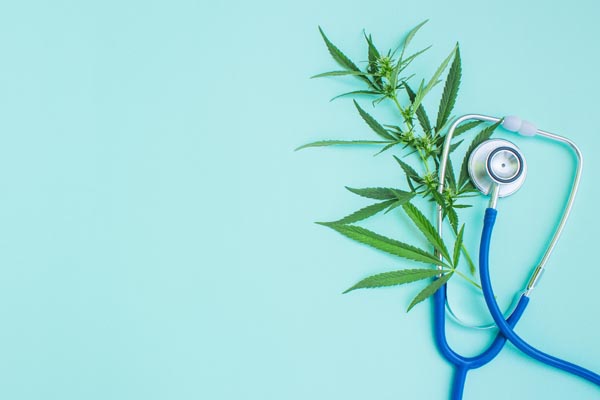
Traumatic brain injuries can be very difficult to diagnose, let alone treat, due to the vast array of symptoms that can vary significantly between individuals.
There have been thousands of people who have found relief from the symptoms of their traumatic brain injuries through the use of medical cannabis.
Many have even gone as far as to say that they feel as though they have regained control over their lives after starting medical cannabis therapy.
If you are interested in starting a medical cannabis program for your TBI symptoms, we here at Kanteeva strongly suggest that you speak with your healthcare practitioner and join the Kanteeva community for helpful information from other medical cannabis patient and practitioners.
We Want to Hear from You

Have you or a loved one found relief from the symptoms of Traumatic Brain Injury by using medical cannabis? If you have, we would love to hear from you!
Please help us spread the word about the amazing benefits that medical cannabis patients are finding all over the world by becoming part of our Kanteeva community.
With your help, thousands of others could finally find relief too.
Please share your stories, comments, and questions below. If you are a medical cannabis patient please also mention what strains have been effective at helping you find relief.
Thank you for taking the time to read this article, we look forward to hearing your story soon!
Learn. Share. Connect.